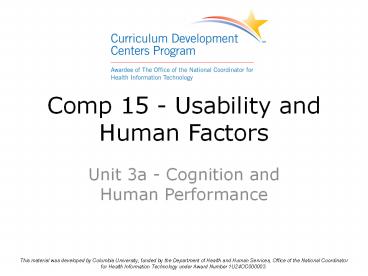Comp 15 - Usability and Human Factors - PowerPoint PPT Presentation
Title:
Comp 15 - Usability and Human Factors
Description:
Comp 15 - Usability and Human Factors Unit 3a - Cognition and Human Performance This material was developed by Columbia University, funded by the Department of Health ... – PowerPoint PPT presentation
Number of Views:263
Avg rating:3.0/5.0
Title: Comp 15 - Usability and Human Factors
1
Comp 15 - Usability and Human Factors
- Unit 3a - Cognition and Human Performance
This material was developed by Columbia
University, funded by the Department of Health
and Human Services, Office of the National
Coordinator for Health Information Technology
under Award Number 1U24OC000003.
2
Overview
- Cognition and Human Computer Interaction in a
cognitive engineering approach - A model of human information processing including
perception, attention, memory and cognition - Mental models and interactive behavior
- Distributed cognition
3
Cognition and Human Computer Interaction (HCI)
4
HCI Cognitive Engineering Approach
- Principles, methods and tools to assess and guide
design of computerized systems to support human
performance - Focus on attention, perception, memory,
comprehension, problem solving, and decision
making - Analysis of cognitive tasks and processing
constraints imposed by the human information
processing system
5
Cognitive Theory and HCI
6
Driving with a Computer Keyboard
- Imagine trying to drive a car using a computer
keyboard. The four arrow keys are used for
steering, the space bar for braking and the
return key for accelerating. To indicate left you
need to press the F1 key and to indicate right,
the F2 key. To sound your horn you need to press
the F3 key. To switch the headlights on you need
to use the F4 key and the F5 key for the
windshield wipers. Now imagine as you were
driving along a road a ball is suddenly kicked in
front of you. What would you do? Bash the arrow
keys and the space bar madly while pressing the
F3 key?
Preece, J. Rogers, Y. Sharp, H. (2007)
Interaction Design Beyond Human-Computer
Interaction. 2nd Edition. New York, NY John
Wiley Sons. P. 92
7
Human Information Processing
8
A Model of Human Information Processing
9
Perception
10
Gestalt Organization Principles
- Perceptual organizing principle
- How we perceive structure in our environment
- Proximity
- Containment
- Similarity
- Closure
- Continuation
- Basic principles with clear implications for web
design
11
No Clear Grouping
12
Proximity
13
Containment
14
Similarity
15
Closure
16
Anyones Guess
17
Airport Status Example
Was the delay Boston or Westchester?
- Was the delay Boston or Westchester?
18
Schedule 1
Newark
Philadelphia
On time
On time
JFK
Boston
On time
Delay
La Guardia
Westchester
On time
On time
Newberg
Long Island
On time
On time
19
Simple Improvement 1
Newark
Philadelphia
On time
On time
JFK
Boston
On time
Delay
La Guardia
Westchester
On time
On time
Newberg
Long Island
On time
On time
20
Simple Improvement 2
Newark - On Time
Philadelphia - On Time
JFK - On Time
Boston - Delay
La Guardia - On Time
Westchester - On Time
Newberg - On Time
Long Island - On Time
21
Human Attention
- Selective Mechanism
- Resource needed for information processing
- Limited
- Sharable
- Flexible
22
Selective Attention
- Ability to ignore extraneous information and
focus on relevant inputs - Performance typically declines as the number of
sources of information increases - Humans can only process information at a finite
rate - Information overload results in errors
23
The Case of Bird Watching
24
Computer Provider Order Entry Systems
25
Representational Effect
26
Digital vs. Analog
27
Glucose and BP Representations
28
Risk Representations (Ancker, 2007)































